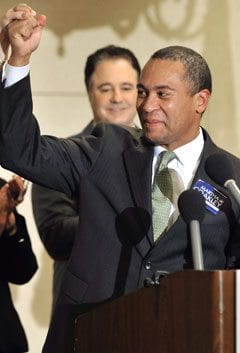
Just weeks into January, Gov. Deval Patrick signed a bill granting himself expanded budget cutting powers. Eleven months later, he approved legislation modernizing the state board that oversees social workers.
In between, Patrick signed dozens of other bills – 185 in all – on matters large (closing the state’s budget gap) and small (allowing assorted liquor licenses).
While a handful of bills, including measures overhauling the states’ ethics and pension systems, received the most attention, they account for only a tiny fraction of the total bills approved, according to an Associated Press review of Statehouse’s legislative tally for 2009.
The review found the bulk of bills passed by the House and Senate, and signed by Patrick, dealt with far less weighty topics.
About 30 of the new laws established so-called “sick banks” for individual state workers. A sick bank allows state employees to donate their unused vacation, personal and sick days to a co-worker who typically needs extra days off to deal with a serious illness.
Unlike workers in private companies, establishing a “sick bank” for a state employee requires an act of the Legislature.
More than 100 of the new laws in 2009 were “home rule petitions” by cities or towns to take actions which require legislative approval – typically on topics as mundane as transferring parcels of land to naming a bridge.
Another favorite home rule petition is the granting of liquor licenses. More than a dozen of the 185 laws approved by the Legislature dealt with alcohol licenses.
The seventh new law signed by Patrick in 2009, for example, authorized the city of Beverly “to grant two additional licenses for the sale of certain alcoholic beverages to be drunk on the premises” of two local restaurants-The Black Cow Restaurant and the American BBQ.
Many of the remaining bills were specialized, from a law allowing camps to conduct criminal history record checks on climbing wall instructors to a law regulating the sport of mixed martial arts.
“Clearly the home rule petitions and the special legislation takes up a lot of time and bears a second look,” said Pam Wilmot, director of the government watchdog group Common Cause Massachusetts.
Wilmot said lawmakers and Patrick still deserve credit for pushing through major pieces of legislation, like the pension and ethics overhauls, the creation of a new state transportation agency, a new green energy law and a measure designed to help preserve publicly assisted affordable housing.
Wilmot said the pension and ethics overhauls were omnibus bills that brought together dozens of smaller bills.
“In the ethics bill, there were probably 50 different bills that were passed as one piece of legislation,” said Wilmot who backed the bill.
In a letter to House members at the end of the formal session, House Speaker Robert DeLeo noted that besides all the new legislation, lawmakers were also grappling with the state’s worsening budget crisis.
“Few could have imagined when the 186th General Court convened on January 7th that this first year of our biennial session would see such unprecedented legislative activity,” DeLeo wrote, using the formal name for the Legislature.
Not everyone was ready to give lawmakers an “A” for the year.
Patrick publicly fumed about the Legislature’s decision to leave in November without taking final action on a major education bill. Patrick called on lawmakers to come back into formal session to take the final votes, something DeLeo dismissed.
The tiff may be a harbinger of an equally busy 2010.
DeLeo has pledged to pass the education bill before a Jan. 19 deadline so the state can apply for extra funding under the Obama administration’s “Race to the Top” program, an initiative to give grants to states that undertake top-to-bottom overhauls of their schools.
There are other politically complex items on the agenda for 2010, including the state’s budget crunch and a push for casino gaming.
(Associated Press)






